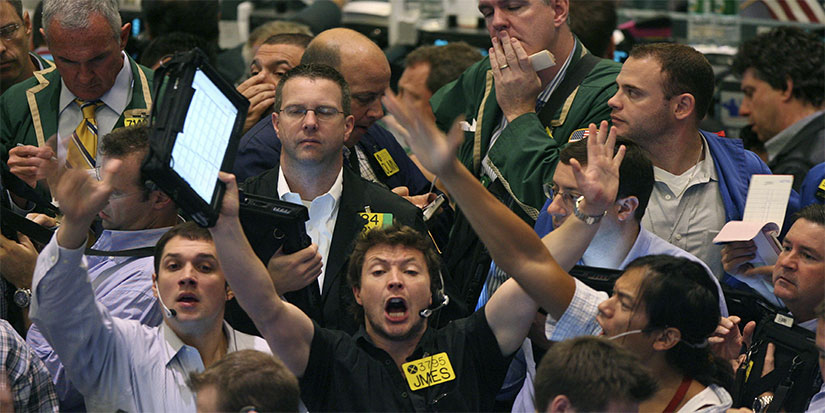
Why Risk a Lot to Make a Little?
-
 Jared Dillian
Jared Dillian
- |
- July 26, 2022
- |
- Comments
I won’t go into too much detail about option theory here, but basically:
- When you buy options, you are risking a little to make a lot
- When you sell options, you are risking a lot to make a little
So why would anyone sell options? Because it’s fun!
I have a friend who loves to sell options. He doesn’t do it too big—just small trades here and there, picking tops and bottoms. He has good instincts, and he’s been pretty successful. I’m actually sort of in awe of it. He’s very good.
But this guy’s whole life philosophy revolves around selling options. Years ago, he formed an LLC and started factoring receivables on an online exchange. It was going well for a while, making $500 here, $1,000 there. Then one of his receivables went bad, and he was back to square one. Factoring receivables is like selling options—99% of the time you make money, and 1% of the time you get housed. Any situation where you can make a little but lose a lot, my friend is involved.
|
I’m preparing my inner circle, the investors I share my analysis and trades with daily, for a fundamental shift away from all this bear market misery, so they’re ready to ride the monster rally I see coming soon. It just so happens I’m briefly opening up membership spots for 10th Man readers in my daily trading letter. |
Nothing’s More Fun Than Free Money
I will say that selling options is infinitely more satisfying than buying options. I did this recently. I sold put options on an ETF at the lows, it traded much higher, and the options will soon expire worthless. That particular trade will net me about $6,000. There is nothing more enjoyable than selling an option and watching it go to zero. Free money, right?
There was a big debate about this 20 years ago around the release of Nassim Taleb’s second book, Fooled by Randomness. It’s still a good read 20 years later. In the book, Nassim takes a firehose to option sellers, calling them idiots and worse. He says you want to be positively exposed to disorder. When you’re selling options, you’re basically betting that nothing will happen. But as we know, things happen.
If you’re an institutional trader and you’re selling options, you’re making a little money each day as your portfolio of short options decays. It’s a bit like a salary. If you buy options, you’re losing a little bit each day, hoping for a big payoff. Banks don’t like losing a little bit each day, and they don’t like lumpy payoffs. Hedge fund investors don’t either.
Nassim has found a home in the tail-risk hedge fund world. It’s about the only place you can make a living buying hedge funds because it offers an attractive risk profile in that it acts as a hedge on the rest of your portfolio. But not many people have the emotional makeup to own a portfolio that loses a little bit of money, day after day.
When Nassim first said this, back in 2001, it was very controversial. And people generally acknowledged that he was right. But it hasn’t changed a lot of behavior in the financial world—people still love to sell options. I know some folks who were short a lot of puts going into the COVID crash—they were sweating it out for a couple of months. And I don’t want to give you the impression that I do this all the time—only in certain circumstances.
I still buy options from time to time, like in 2020 when I bought calls on the Energy Select Sector SPDR Fund (XLE), which turned out to be a very good trade. But if you go around randomly buying call options, you’re likely to be disappointed. Most options are actually overpriced, particularly in things like the iShares iBoxx $ High Yield Corporate Bond ETF (HYG), where people are always buying puts for a crash.
I Don’t Trade Options
But really, I don’t do much in the way of options trading these days. When I first learned about options, in 1999, I got really excited and wanted to trade them all the time. Then I began to lose interest. There are a lot of situations—most situations, in fact—where you’re better off just buying the stock and not screwing around with options. People make things way too complicated. There is an art to trading the underlying stock that’s underappreciated. And it’s easy enough to lose your ass trading stocks; you don’t need options to make it worse.
Problem is, everyone wants to trade options these days. Or at least they did in 2021. Robinhood got everyone signed up for options trading, and they piled into call options on meme stocks. Billions of dollars just evaporated. Those were very overpriced options. And nobody knew what the hell they were doing. There’s a huge amount of math involved, and if you’re not going to take the time to learn it, you shouldn’t trade options.
Take it from me. Options are overrated. Bonds, on the other hand, are something every investor should learn about. Keep your eyes peeled for more on that from me soon.

Jared Dillian
subscribers@mauldineconomics.com

 Jared Dillian
Jared Dillian